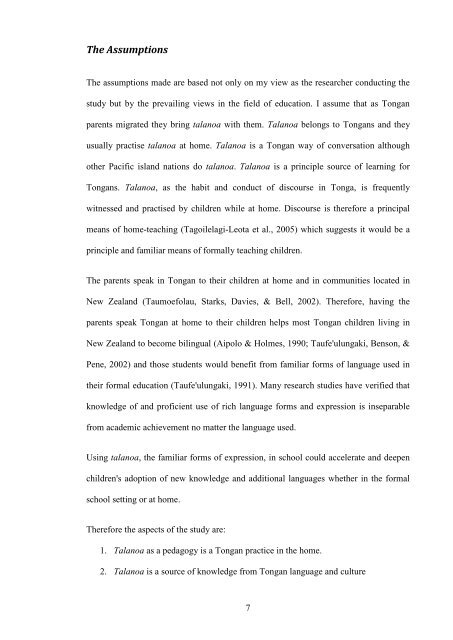Talanoa - Scholarly Commons Home
Talanoa - Scholarly Commons Home
Talanoa - Scholarly Commons Home
You also want an ePaper? Increase the reach of your titles
YUMPU automatically turns print PDFs into web optimized ePapers that Google loves.
The Assumptions<br />
The assumptions made are based not only on my view as the researcher conducting the<br />
study but by the prevailing views in the field of education. I assume that as Tongan<br />
parents migrated they bring talanoa with them. <strong>Talanoa</strong> belongs to Tongans and they<br />
usually practise talanoa at home. <strong>Talanoa</strong> is a Tongan way of conversation although<br />
other Pacific island nations do talanoa. <strong>Talanoa</strong> is a principle source of learning for<br />
Tongans. <strong>Talanoa</strong>, as the habit and conduct of discourse in Tonga, is frequently<br />
witnessed and practised by children while at home. Discourse is therefore a principal<br />
means of home-teaching (Tagoilelagi-Leota et al., 2005) which suggests it would be a<br />
principle and familiar means of formally teaching children.<br />
The parents speak in Tongan to their children at home and in communities located in<br />
New Zealand (Taumoefolau, Starks, Davies, & Bell, 2002). Therefore, having the<br />
parents speak Tongan at home to their children helps most Tongan children living in<br />
New Zealand to become bilingual (Aipolo & Holmes, 1990; Taufe'ulungaki, Benson, &<br />
Pene, 2002) and those students would benefit from familiar forms of language used in<br />
their formal education (Taufe'ulungaki, 1991). Many research studies have verified that<br />
knowledge of and proficient use of rich language forms and expression is inseparable<br />
from academic achievement no matter the language used.<br />
Using talanoa, the familiar forms of expression, in school could accelerate and deepen<br />
children's adoption of new knowledge and additional languages whether in the formal<br />
school setting or at home.<br />
Therefore the aspects of the study are:<br />
1. <strong>Talanoa</strong> as a pedagogy is a Tongan practice in the home.<br />
2. <strong>Talanoa</strong> is a source of knowledge from Tongan language and culture<br />
7

















